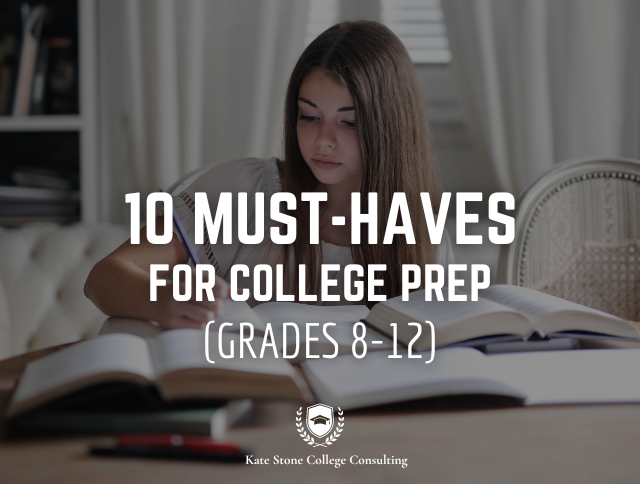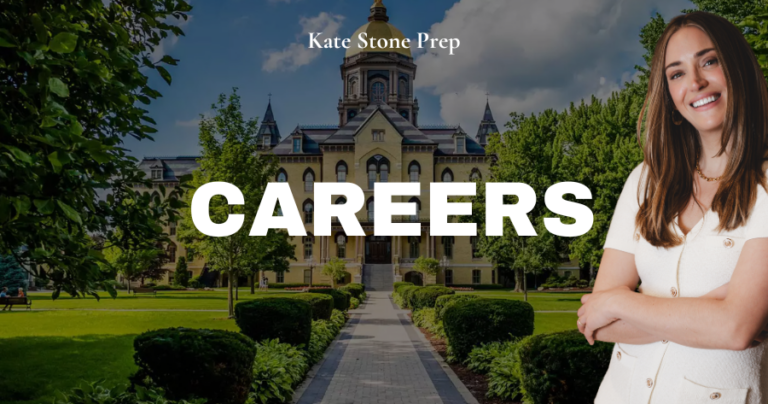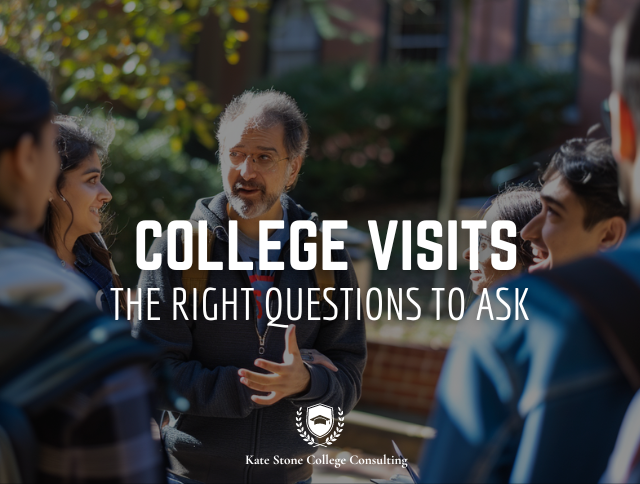(203) 714-4435

The term “college prep” is used in a variety of ways.
For some, college prep is a single class. For others, it refers to a high school specialized in college placement. For others, it might fall somewhere in between, including some test prep services and making sure you pick the right high school classes.
At Kate Stone College Consulting, we take a holistic approach to college prep.
This article outlines the ten components we believe every student should consider when preparing for college.
This process starts around 8th grade in middle school and continues up through the summer before you start college.
If you have any questions about the college application process, please contact our team here for a free consultation.
1. Academic Rigor for College Prep
When we plan college prep with families, we always prioritize academics. Your course selection and grades will tell colleges about your ability to handle college’s academic demands.
Tips for Academic Rigor:
- Before jumping into all AP classes too early in high school, ensure you can handle them. You don’t want to need a GPA boost during your junior year.
- Tutoring can make the difference between Cs, Bs, and As.
- Learn how to manage your time and priorities.
- If you are aiming for the Ivies, you will want top marks in as many AP or IB classes as you can handle (or in-depth personal projects discussed below).
- Consider taking college or auxiliary classes outside your school in your areas of interest.
- Enter your work into competitions like science fairs, literary contests, or art exhibits.
We offer tutoring, executive functioning training, course selection recommendations, competition coaching, and homework and study oversight to support your academic college prep.
2. Test Prep
Test prep is beneficial for all subjects in high school, especially those subjects that students struggle with. We find that once students learn how to test in all of their subjects, their grades improve, and the skill stays with them into college.
Standardized test prep for the ACT and SAT should bridge academic gaps in math and English. Then, students will generally learn through test-taking strategies and lots of practice questions.
Some Tips for Test Prep:
- Learn how to test in each subject (a tutor can help with this)
- Get into a regular study rhythm before tests
- Take advantage of any testing accommodations you have
- Fill your math and English gaps for the SAT / ACT
- Do lots of practice SAT / ACT questions
- Don’t believe the thought, “I’m just bad at test-taking.” Everyone can and will improve with help and practice!
To support your test prep, we offer academic tutoring, test prep training for each academic subject, help studying for specific tests, SAT and ACT prep services, and homework and studying oversight.
3. Extracurricular Activities for College Prep
You already know that extracurricular activities help with college applications.
Generally, colleges want to see long-term and deep involvement with your extracurriculars. Your goal is to work towards leadership roles and expand your group’s community influence. If your interests change, that’s normal! However, can you intelligently explain why?
If you have a major in mind, ensure your activities prove you are interested. For example, if you want to enter Business, join the Future Business Leaders of America and run for Student Government.
Colleges value applicants who engage in activities beyond academic requirements and demonstrate time management, leadership, and a well-rounded character.
Tips for Extracurricular Activities:
- Develop 2-3 areas of interest
- Go for depth over breadth with your activities
- Align your activities with your intended Major or areas of study
- Work for impact more than participation
When you work with us, we check in regularly to make sure your child is in the best extracurricular activities for them at that time. We can help you research new activities and offer coaching on making the most of each Extracurricular Activity so the experience stands out to colleges.
4. Volunteer Work for College Prep
There is a reason colleges want to see volunteer work. It hints at how you might engage and bring value to their community.
Community service and volunteer work provide valuable insight into your life outside of the classroom. It helps build character and keep students in a place of serving their community.
It can also be a great way to take an area of interest from the theoretical to the real world.
As with extracurriculars, pursue long-term involvement with volunteer work that clearly aligns with your values and interests. Be able to explain why you volunteer, what you bring to the experience, and how you grow from it.
Tips for Volunteer Work for College Applications:
- Find volunteer work that aligns with your interests
- Plan to volunteer continually throughout high school (and college)
- Learn to speak about why the work matters to you and others
- Network with people involved in the organizations you volunteer for
- Look to bring other interested people into your volunteer work
To support your child’s volunteer experience, we will help research and suggest opportunities, coach your child on networking and relationship building, and help them practice speaking and writing about the importance of their work.
5. Independent Learning for College Prep
The love of learning will take you far!
Even with busy schedules, we encourage students to pursue independent learning. Not only does this make for more knowledgeable students, but it helps students apply this learning to multiple educational contexts.
Independent learning can involve anything from watching documentaries, listening to podcasts, reading articles to taking extra online classes or conducting an independent research project.
Students who learn outside their required courses and programs have higher levels of understanding in core subjects and greater academic contexts to write about in their college applications.
Some Tips for Independent Learning:
- Read everything you can find on your interests
- Take a independent course in an area of interest
- Conduct research and write a paper
- Find and engage mentors to learn from
We love supporting independent learning and have exceptional mentors to help students design, plan, and complete independent learning projects. This service is included with our College Prep packages!
6. Special Projects for College Prep
A special project takes Independent Learning to the next level.
Special projects should take an area of interest and produce something that a) creates community connection and impact b) develops your unique competencies and skills c) uplevels your knowledge of that interest.
It should involve something bigger than you can do on your own.
Our more tech-savvy students build something, our artistic students produce an event, and a scientifically inclined student experiments under the tutelage of a professor.
When the boxes of grades, extracurriculars, and volunteer work are checked, the special projects set students apart.
Tips for Special Projects:
- Do projects aligned with your area of interest
- Align the project with potential college majors
- Seek the help of one or more mentors or guides
- Special projects make great summer activities
- Record or document your project
- Bring the project to completion
Special projects are our specialty! We work with our students to design unique projects that take their classroom, extracurricular, and personal interests much further. Also, we can build on your existing projects throughout high school and college.
7. Community Impact for College Prep
We live in a connected world and can make a massive impact on our personal, local, virtual, and global communities.
In your college application, you will be asked what communities you contribute to and gain identity from.
The key here is to set measurable goals and keep records of your successes.
Community impact will likely involve expanding one of your interests, extracurriculars, or volunteer projects into your community. Prioritize your local community and expand from there. Colleges love “hometown heros.”
Tips for Community Impact:
- List all of the communities, large and small, you are a part of (it may be more than you think)
- Become a initiator for positive change in your communities.
- Keep track of measurable impacts (number of people helped, amount of funds raised, growth you contributed to in an organization)
- Practice motivating and involving other people in your efforts.
We assign mentors to all our students to help them create measurable impacts on their communities. Our executive functioning program will help students develop the soft skills necessary to complete each project.
8. Self Development for College Prep
College prep should focus on your child’s personal development. Beyond getting into college, most students need modeling and practice to set goals and track growth.
All college prep areas outlined here will affect a student’s self-development. However, some students may benefit from activities specifically relating to their personal development, such as faith-based, counseling-related, or mentorship-driven activities.
Tips for Self-Development:
- Practice writing down and setting targets for achieving personal goals
- Keep a log of significant moments and how you evolved through those experiences.
- Seek out mentors who model the behavior you would like to develop
- Read books about people you admire
We pair all students with mentors who will motivate and encourage your child to pursue and document their self-development journey. All students also go through executive functioning training, which supports self-development.
9. Network Building (Including Recommendations Relationships)
We teach students that their net worth comes from their network.
The more teachers, professors, coaches, professionals, mentors, friends, and family your child can develop quality relationships with, the better.
However, most students need practice and instruction on making, nurturing, and maintaining long-term relationships outside their peer groups.
It is worth noting that when it comes time to request letters of recommendation for college applications, students will get the best recommendations from mentors who have seen them grow and succeed over time.
Tips for Network Building for College Prep
- Learn how to network and nurture relationships long term
- Seek out mentors and guides outside of your day-to-day environment
- Practice eye contact, public speaking, and varied forms of creative, thoughtful follow-up
- You will need deep and meaningful relationships with mentors when applying to internships, special programs, and colleges
When working with our team, your student will learn the soft skills and systems that benefit building professional and personal connections.
10. Work Experience for College Prep
No school-based learning can replace real-world experience.
We encourage all students to pursue work experience while in high school. This may involve getting a paid job, applying for an internship, starting a business, or helping a family member or mentor at work.
Students often report that their work experience gave them valuable perspectives and skills that helped them later in life.
When choosing what work experience to pursue, we highly suggest aligning it with your goals, interests, and other activities. This will help show colleges demonstrated interest in your areas of study.
Tips for Work Experience:
- Find some work experience while in high school
- Align your work with your values, interests, and other activities
- Perform your absolute best and learn to optimize the opportunity regardless of the job you choose
- Learning how to search for, apply for, and get jobs is a valuable life skill
We mentor our students in finding the optimal work experiences based on their chosen academic pathway. We continue to teach this skill in college when we connect them to our guaranteed job placement program.
Conclusion
Our approach to college prep is the best way to prepare for college and beyond. Our list of the top ten essentials comes straight out of the comprehensive college prep services we provide to our clients.
We encourage you to start implementing two or three of the suggestions above if you are working with your child to prepare for college. Reach out if you would like help! We provide free consultations and a customized four-year plan for your child.
If you want to plan, you can learn more about college admissions and application support here!



